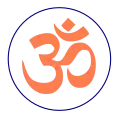Somayajna
The Somayajna (Sanskrit: सोमयज्ञ, romanized: Somayajña) or Somayaga (ISO: Sōmayāga) or Soma sacrifice[1] is a Hindu ritual. It is a type of yajna associated with the lunar cycle, and regarded to be performed for the maintenance of the cosmic order.[2]
| Part of a series on |
| Hinduism |
|---|
 |
This ritual is based on methods described in the Vedas. Soma is used as the main offering in this yajna, regarded to be able to propitiate deities. It is prescribed to be performed only by the Brahmanas.[3] A priest who performs this yajna is termed as a Somayaji.
Types
The seven types of Somayajna are:[4]
- Agniṣṭoma – The first and main type, the six others are considered variations of this
- Uktya
- Ṣoḍaśī
- Atyagniṣṭoma
- Atirātra
- Āptoryāma
- Vājapeya
References
- Gonda, Jan (1975). A History of Indian Literature: Vedic Literature (Saṃhitās and Brāhmaṇas). Vol. 1. Wiesbaden: Otto Harrassowitz. p. 328.
- Irby, Georgia L. (2019-12-05). A Companion to Science, Technology, and Medicine in Ancient Greece and Rome, 2 Volume Set. John Wiley & Sons. p. 953. ISBN 978-1-119-10070-6.
- Lidova, Natalia (1994). Drama and Ritual of Early Hinduism. Motilal Banarsidass Publ. p. 38. ISBN 978-81-208-1234-5.
- Renou, Louis (1947). Vedic India. Susil Gupta. pp. 106–107.
External links
This article is issued from Wikipedia. The text is licensed under Creative Commons - Attribution - Sharealike. Additional terms may apply for the media files.
